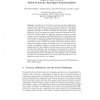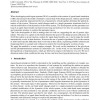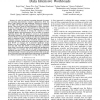396 search results - page 57 / 80 » How scientific models can explain |
EEMMAS
2007
Springer
14 years 1 months ago
2007
Springer
Complexity of near future and even nowadays applications is exponentially increasing. In order to tackle the design of such complex systems, being able to engineer self-organising ...
ISCAS
2006
IEEE
14 years 1 months ago
2006
IEEE
Abstract— The heterogeneity in the current and future multimedia environment requires an elegant adaptation framework for the production and consumption of different kinds of mul...
JUCS
2010
13 years 2 months ago
2010
: All processes of life are controlled by networks of interacting biochemical components. The purpose of modelling these networks is manifold. From a theoretical point of view it a...
MABS
2005
Springer
14 years 1 months ago
2005
Springer
When developping multi-agent systems (MAS) or models in the context of agent-based simulation (ABS), the tuning of the model constitutes a crucial step of the design process. Inde...
CCGRID
2009
IEEE
14 years 2 months ago
2009
IEEE
—In order to meet the increasing demands of present and upcoming data-intensive computer applications, there has been a major shift in the disk subsystem, which now consists of m...



